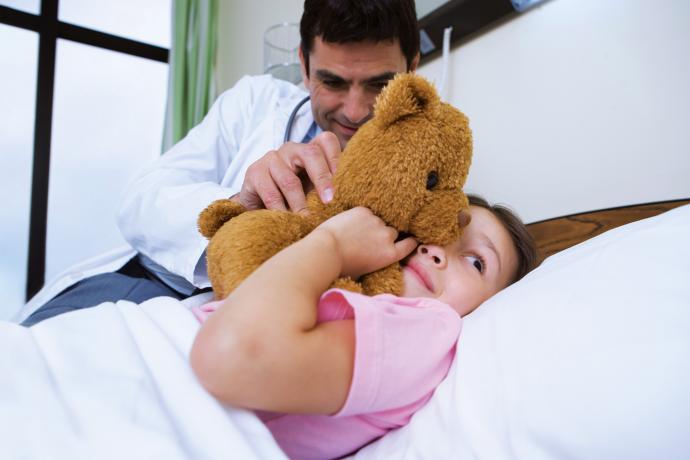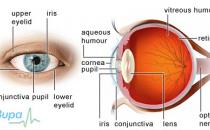Fever in children

A child's body temperature is usually between 36.5°C and 37.5°C. A fever is a body temperature above this range.
About fever in children
Symptoms of fever in children
Causes of fever in children
Diagnosis of fever in children
Treatment of fever in children
About fever in children
A fever is a high temperature. Fever isn't an illness in itself; it’s usually caused by a virus or bacterial infection. Fever is thought to be part of your body's natural response to an infection.
Fevers are common in young children. They are usually caused by viral infections and clear up without treatment. However, a fever can occasionally be a sign of a more serious illness, such as a severe bacterial infection of the blood (septicaemia), urinary tract infection, pneumonia or meningitis.
Symptoms of fever in children
If your child has a fever, he or she will have a body temperature above 38°C.
As well as having a high temperature, your child may also:
- feel tired
- look pale
- have a poor appetite
- be irritable
- have a headache or other aches and pains
- feel generally unwell
In some children a sudden increase in body temperature can lead to seizures (also known as fits), which are called febrile convulsions. During a febrile convulsion, part or all of your child's body may shake and twitch and your child’s eyes may roll back in his or her head. Although febrile convulsions can be frightening, they usually last no longer than six minutes. Your child may seem confused immediately after the convulsion, but he or she is likely to make a full recovery.
Fever can occasionally be a sign of a serious infection. Contact your GP immediately or go to hospital if your child:
- is unusually sleepy or difficult to wake up
- has blue-ish or mottled skin
- has cold hands and feet
- has a weaker than usual, high pitched cry or won’t stop crying
- has difficulty breathing or is breathing very quickly
- has a stiff neck
- is vomiting
- develops a rash that doesn’t disappear when pressed
- has a fit
You should also contact your GP if your child’s fever lasts longer than five days.
Always seek medical advice if your child develops a fever soon after an operation, or soon after travelling abroad.
Causes of fever in children
Most fevers are caused by common viral infections that go away on their own, such as the common cold. Sometimes a fever can be caused by something more severe, such as an ear, bladder or kidney infection. Rarely, a fever can be a sign of a serious illness such as meningitis or septicaemia.
Occasionally, your child may develop a fever as a symptom of a specific condition rather than as a result of an infection. For example, certain blood disorders and autoimmune disorders may cause a fever. In this case, the fever lasts for longer than one associated with an infection.
Fever can also be a side-effect of some childhood immunisations.
Diagnosis of fever in children
You can take your child’s temperature from his or her mouth or armpit using a digital, glass or ear thermometer. Mercury thermometers are no longer recommended. This is because there is a risk the thermometer could break and release the mercury, which is poisonous, into your child's body.
You may find it easier to take the temperature from the armpit as it may be difficult for your child to keep a thermometer in his or her mouth. However, bear in mind that these measurements are less accurate as the armpit is slightly cooler. To take your child’s temperature this way, place the thermometer under his or her armpit, directly against the skin, and hold his or her arm gently against the chest.
To take your child’s temperature from the mouth, place the thermometer under your child’s tongue for two to three minutes.
If your child has a temperature of over 38°C and you’re concerned, contact your GP. He or she will ask about your child's symptoms and can advise whether your child needs to be examined. If so, your GP will take your child’s temperature and measure his or her heart rate and breathing. Your GP may also ask about your child’s medical history. It may help if you keep a record of your child's temperature and other symptoms so that you can give clear information to your GP.
There is likely to be an obvious cause for your child’s fever, so he or she may not need to have further tests. However, if your child’s fever lasts longer than a few days and the cause isn’t clear, your GP may also take a blood sample and/or a urine sample. If your GP is concerned about your child’s symptoms, he or she may be referred to a paediatrician (a doctor who specialises in children’s health) and, very rarely, your GP may ask for emergency medical help.
Treatment of fever in children
In most cases, your child's fever will be caused by a viral infection and will get better on its own. Monitor your child's fever by regularly checking his or her temperature.
Self-help
Many parents and carers spend a lot of time trying to bring down their child’s fever. However, a fever is part of the body’s natural response to infection and can often be left to run its course provided your child is drinking enough and is otherwise well. If your child is having trouble drinking, trying to reduce his or her temperature may help with this. This is important in preventing[EA1] your child from becoming dehydrated, which[EA2] can lead to more serious problems. As a guide, your child's urine should be pale yellow – if it's darker, your child may need to drink more fluids.
Keep your child away from school or nursery while he or she has a fever.
Medicines
You can try paracetamol or ibuprofen to reduce your child’s temperature if he or she is particularly distressed. Don’t give your child these medicines to reduce temperature if he or she is otherwise well, or to prevent a febrile seizure.
Don’t give your child paracetamol and ibuprofen together. However, if the first medicine you try doesn’t help, you can try the other one later.
You can buy medicines that are suitable for children from a pharmacy without a prescription. Always read the patient information leaflet that comes with your child’s medicine and if you have any questions, ask your pharmacist for advice.
If your child has a bacterial infection, your GP may prescribe him or her a course of antibiotics.
This section contains answers to common questions about this topic. Questions have been suggested by health professionals, website feedback and requests via email.
How can I tell if my child is dehydrated?
Is it true that children may be at risk of fever and fits after having a vaccination?
What should I do if my child has a febrile convulsion?
How can I tell if my child is dehydrated?
If your child is dehydrated, he or she may have a dry mouth, pale and mottled skin, sunken eyes and no tears when he or she cries.
Explanation
You become dehydrated when there isn't enough water in your body. This can happen if your child has a fever, so it's important to check for signs of dehydration.
Signs of dehydration include a dry mouth, pale and mottled skin, sunken eyes, no tears, cool hands and feet and unusual breathing patterns. You may notice that your child is passing less urine than usual (fewer wet nappies). A baby may also have a sunken fontanelle (the soft spot on the top of his or her head – you may be able to feel this gently with your fingertip).
Encourage your child to regularly drink fluids if he or she has a fever. If you’re breastfeeding, it's fine to offer your breast milk.
Contact your GP for advice if you think that your child is showing signs of dehydration.
Is it true that children may be at risk of fever and fits after having a vaccination?
Yes, vaccinations can sometimes cause fever and associated fits (febrile convulsions or seizures), but the chance of this happening is very small.
Explanation
Fever is a possible side-effect of some childhood vaccinations. For example, the measles, mumps and rubella (MMR) vaccine can cause fever in children. Rarely, your child may get a fever about a week after he or she has the MMR injection, which can last for a few days. You can usually look after your child at home, but contact your GP if you’re concerned about his or her symptoms.
Even more rarely, the MMR vaccine can cause your child to have a febrile convulsion, again about a week after the vaccination. If your child has a convulsion after his or her vaccination, contact your GP immediately.
It’s important to remember that the risk of your child having a febrile convulsion after the MMR vaccination is lower than the chance of them having one if they become infected with measles. Research has shown that there are no long-term effects in children who have had a febrile convulsion.
What should I do if my child has a febrile convulsion?
It can be frightening if your child has a febrile convulsion but convulsions aren’t usually harmful. However, your child may get injured if he or she falls or chokes, so it’s important to make him or her as safe as possible. Stay with your child and try to time how long the seizure lasts.
Explanation
A sudden increase in body temperature can sometimes lead to seizures in children (also known as fits), which are called febrile convulsions. During a febrile convulsion, part or all of your child's body may shake and twitch, and his or her eyes may roll back in the head.
Although febrile convulsions rarely last longer than a few minutes, they can be very frightening.
If your child has a febrile convulsion, try to stay calm. Don’t restrain your child but try to make him or her as safe as possible, preferably on a soft surface. Loosen your child’s clothing if you can, and try to remove anything in your child’s mouth, such as food or a dummy, as this could cause choking.
Your child may seem confused immediately after the convulsion, but he or she is likely to make a full recovery. Even though febrile convulsions don't usually cause any lasting problems, it's important to keep a close eye on your child both during and afterwards, especially if it's the first time that your child has had one.
If your child's convulsion lasts for more than five minutes, take him or her to your nearest accident and emergency department. If the convulsion stops after less than five minutes, contact your GP for advice. It’s also a good idea to contact your GP if this is the first time your child has had a seizure.
Further information
-
Meningitis Research Foundation
0808 800 3344
Sources
- Caring for children with fever. Royal College of Nursing. www.rcn.org.uk, published December 2008
- Feverish illness in children. Assessment and initial management in children younger than 5 years. National Institute for Health and Clinical Excellence (NICE), 2007. www.nice.org.uk
- When the child has a fever. Drug Ther Bull 2008; 46:17–21. doi:10.1136/dtb.2008.03.0005
- Febrile seizure. Clinical Knowledge Summaries. www.cks.nhs.uk, published June 2008
- Fever. Merck Manuals Online Medical Library. www.merckmanuals.com, published January 2007
- Defences against infection. Merck Manuals Online Medical Library. www.merckmanuals.com, published October 2008
- Joint Formulary Committee. British National Formulary. 60th ed. London: British Medical Association and Royal Pharmaceutical Society of Great Britain; 2010
- Febrile seizures factsheet. National Institute of Neurological Disorders and Stroke. www.ninds.nih.gov, published 2011
Related topics
- Antibiotics
- Childhood immunisations
- Common cold
- Measles, mumps and rubella (MMR) vaccine
- Meningitis and septicaemia
- Over-the-counter painkillers
- Pneumonia
- Seasonal flu















